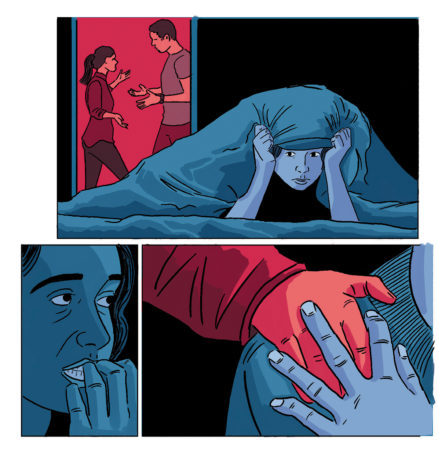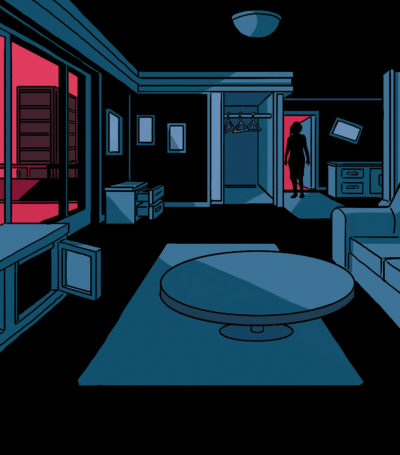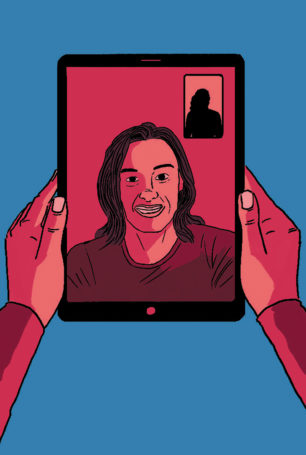March 26, 2021
Supports for victims of domestic violence adapted for our constantly changing world
March 26, 2021
Supports for victims of domestic violence adapted for our constantly changing world
The COVID-19 global pandemic has created a crisis within a crisis. In lockdowns around the world, the movement restrictions in place to stop the spread of the virus have correlated with a rise in more severe incidents of domestic violence.
The trend in Edmonton is the same as elsewhere. During the pandemic, domestic-violence calls to the police have increased, and mental-health incidents that involve the police are on the rise.
Now more than ever, vulnerable women are relying on community-based organizations for assistance. Katherine O’Neill, chief executive officer for YWCA Edmonton, says that responding to this crisis has been challenging. “Normally, a crisis comes and goes quite quickly, but we are going to be in a crisis situation fora year or longer. This is extraordinary for a non-profit to keep on top of,” she says.
O’Neill says the increase in domestic violence “comes down to the fact that there is a lot of stress in the home economically, and having the children in the home more […] When you put all that together in an unhealthy relationship, it can lead to violence.”

Groups such as the Indo-Canadian Women’s Association are rising to the occasion. It was established in 1984 with the goal of ensuring newcomers to Canada have representation and equal opportunities for integration in their new homeland. Over time, the association has specialized in research on issues such as honour-based killings, and a preference for male children. These are issues around which the Indo-Canadian Women’s Association has a lot of experience facilitating conversations, says executive director Sadia Sameeullah.
“Domestic violence has spiked during these times and we wanted to create a safe platform for women to approach culturally appropriate services to reach out for help,” says Sameeullah. During the pandemic, they hired a ‘systems navigator’ with the help of funding from Edmonton Community Foundation (ECF).
ECF granted more than $300,000 to assist organizations supporting vulnerable people experiencing domestic violence during the pandemic. The funding comes from the Foundation’s Rapid Response Fund and the Government of Canada’s Emergency Community Support Fund (ECSF). The ECSF was established by the Government of Canada and the Foundation has been collaborating with the Canadian Red Cross, Community Foundations of Canada and United Way Centraide Canada to flow ECSF support to those who need it most.
“I am so immensely grateful for the funding. There has been an exponential increase in calls and the women calling us sometimes have language barriers […] The person we have hired is fluent in a few South Asian languages — she speaks Punjabi, Hindi, Urdu and Gujarti,” says Sameeullah.
The systems navigator works with women in understanding how the legal system in Canada works, as well as helping women who are looking to leave a domestic violence situation create a safety plan. Leaving an abusive relationship can be tough, and a safety plan helps to ensure that a victim knows who to contact, and has a back-up plan for a place to stay.

Sameeullah shared a story of a client they had been able to assist during COVID.
“There was a woman who approached us, she just walked in from the street. She reported that her husband had walked out on her and she didn’t know what to do. He had disappeared with all her valuables and jewelry and left her stranded in a rental property. We supported her in reporting the crime and got her into transitional housing. Now she’s actually pursuing an employment and career development program and she’s looking at healing and finding a job,” says Sameeullah.
Funding from ECF also assisted the organization Little Warriors — which offers support to children and families healing from the trauma of sexual abuse — with the creation of an online counselling program called “Be Brave Bridge” or BBB.
“Because of COVID, we basically had to shut everything down and send all the kids home from mid-March until mid-June. We also had to lay off most of our staff. Because the kids were in our care however, we couldn’t just abandon them … so we used this time to develop something that had been on our radar for a very long time — online programs for caregivers, teens and children which they could access from their home,” says Laurie Szymanski, CEO of Little Warriors.

The Little Warriors team of therapists used the time that the centre was closed to create three programs: one for families, one for teens and one for children.
One of the parents who had recently completed the BBB program found it immensely helpful. “The BBB online program felt like a light at the end of the tunnel and that I was not alone and had something to hang on to […] like a lighthouse,” says the parent, who was not named for privacy reasons. “I have taken many parenting programs, but the difference with the BBB program was it was so specific to the issue; it was written in a way that made sense. Having an online coach helped with self-reflection and working through mindful parenting practices.”
As the lockdowns continue, so too does the work of these organizations. They’ve worked to become adaptive to the new normal which they find themselves in. Although there is a light at the end of the tunnel thanks to vaccines, much of the work to heal the trauma of the pandemic will remain.